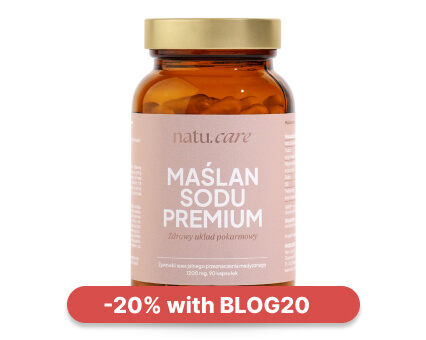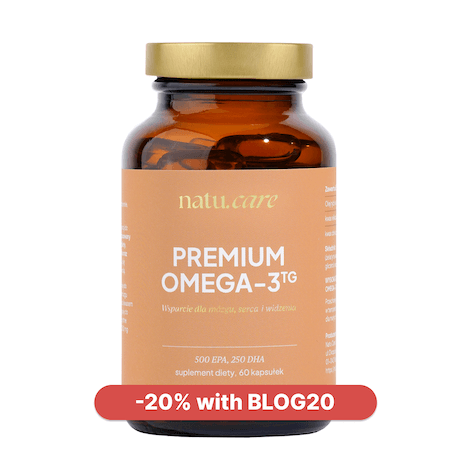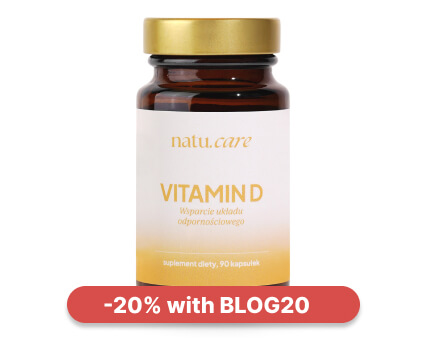Cysteine (L-cysteine): what it is, properties, formula, where it occurs
Cysteine is one of the amino acids responsible for the production of collagen.


Learn more about our editorial process
.

Learn more about our editorial process
.

Learn more about our editorial process
.

Learn more about our editorial process
.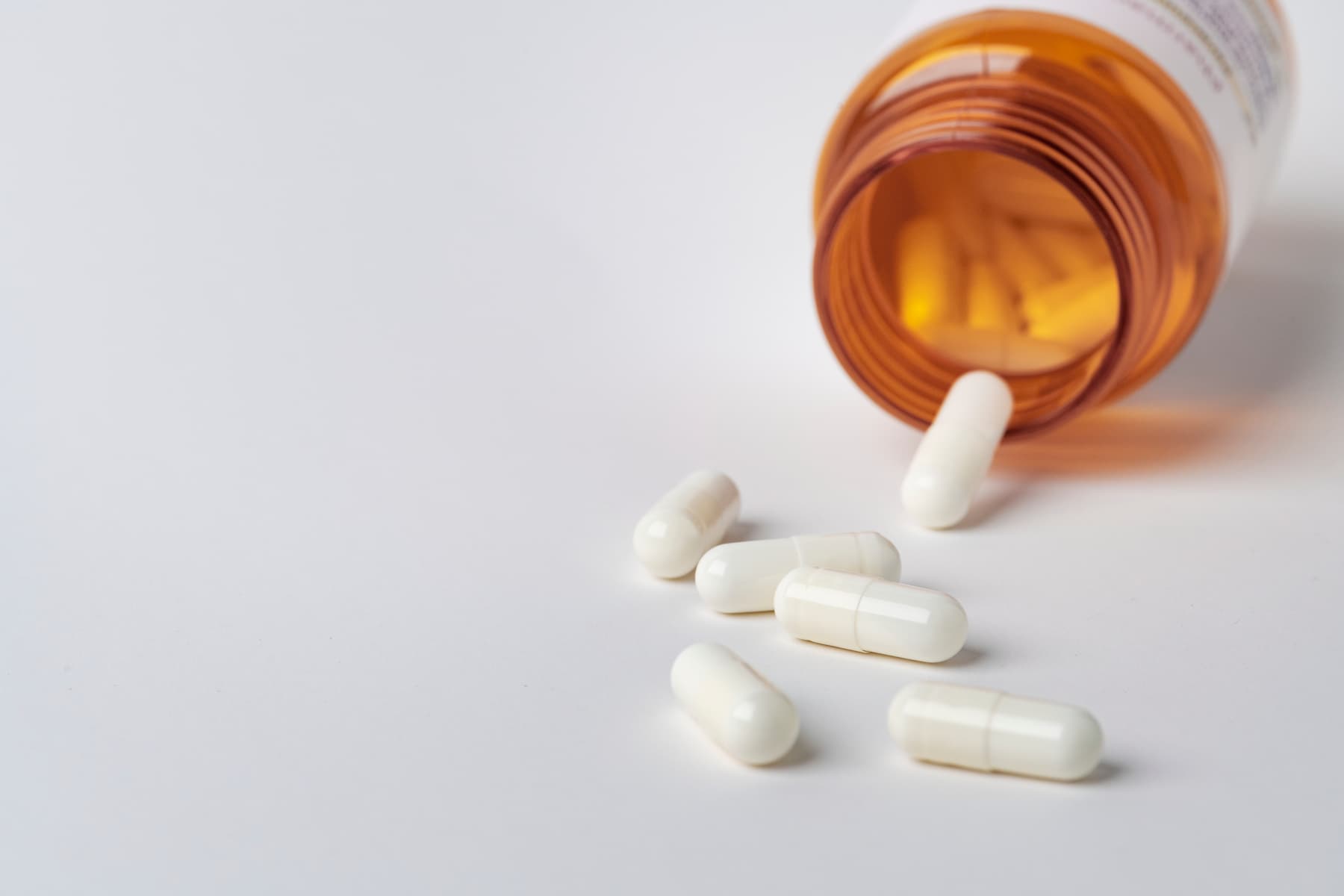
Why you can trust us
Articles on Natu.Care are written based on scientific research, data from government websites and other reliable sources. The texts are written in cooperation with doctors, nutritionists and other health and beauty experts. Articles are reviewed before publication and during significant updates.
.Learn more about our editorial process
.Information about advertisements
Content on Natu.Care may contain links to products from the sale of which we may receive a commission. When creating content, we adhere to high editorial standards and take care to be objective about the products discussed. The presence of affiliate links is not dictated by our partners, and we select the products we review ourselves completely independently.
.Learn more about our terms and Conditions
.Cysteine is an inconspicuous amino acid that supports skin health, detoxifies the body and regulates metabolism. Although the human body produces it on its own it is worth considering supplementation in some cases.
Check out the most important information about cysteine prepared together with Ilona Krzak, MSc pharmacy.
From this article you will learn:
.- What is cysteine and how it differs from L-cysteine.
- What is cysteine?
- What functions cysteine has in the body.
- What it does.
- How to dose it and which products it is found in.
- How to dose it.
See also:
.What is cysteine?
.Cysteine is a amino acid that has many functions in the body. It is important for the formation of proteins, including keratin, which is responsible for the condition of hair, skin and nails. Additionally, cysteine is involved in the production of one of the most important antioxidants in the body - glutathioneand.
Cysteine is an endogenous amino acid, i.e. one that the body can produce on its own. Nevertheless, during certain metabolic diseases or inflammatory conditions, the demand for cysteine increases. In such cases, supplementation withand may be beneficial (and sometimes even necessary).
Cysteine versus L-cysteine - what's the difference?
.Cysteine and L-cysteine are actually the same amino acid. The prefix "L-" is used to describe the specific orientation of the molecule.
Molecules of many amino acids - including cysteine - occur in two mirrored forms known as isomers. Isomers are molecules that have the same composition but differ in the arrangement of their atoms. In the case of amino acids, these two isomers are called 'L' and 'D'and.
We can compare this to human hands. Both are relatively the same, have similar functions, and similar capabilities. However, when you want to superimpose one on top of the other, you will notice that they occur in a mirror image.
When we talk about cysteine in a biological context, we usually mean L-cysteine. It is the one that is biologically active and therefore responsible for the vast majority of functions in the body. There is also D-cysteine, which, however, does not have many beneficial properties and is therefore usually not studied by specialistsand.
What formula does cysteine have?
.The chemical formula of cysteine is: C3H7NO2S. This amino acid contains three carbon atoms (C), seven hydrogen atoms (H), one nitrogen atom (N), two oxygen atoms (O), and one sulfur atom (S)and.
Structurally, cysteine is an amino acid with a thiol group (consisting of a sulphur atom and a hydrogen atom) that allows specific structures (disulphide bridges) to form. And these are crucial for the stability of protein structuresand.
The sulphur atoms in cysteine have the ability to break down the glycoproteins of mucus into smaller molecules and to liquefy it and reduce its viscosity, which greatly facilitates expectoration without additional secretion production. This function is used in mucolytic drugs..
 .
.
Ilona Krzak Master of Pharmacy
Are N-acetylcysteine (NAC) and cysteine the same substance?
.No, N-acetylcysteine (NAC) and cysteine are not the same substance, although they are closely related. Cysteine is an amino acid that occurs naturally in the human body. N-acetylcysteine (NAC), on the other hand, is a derivative of cysteine. It has been modified by the addition of an acetyl group (CH3CO), which increases its stability and bioavailability to the bodyand.
NAC is a popularly used dietary supplement due to its antioxidant capacity. Additionally, it is converted to cysteine in the body, increasing the concentration of this amino acid.
Cysteine is being studied for its effect on the risk of later cancer..
 .
.
Ilona Krzak Master of Pharmacy
What cysteine is for - action and properties
.Cysteine is an amino acid that significantly affects the functioning of the human body. Its unique properties affect skin health, metabolic processes and the body's ability to fight toxins.
How exactly does cysteine work?
.Promotes skin health
.Cysteine is one of the main components of keratin, which is responsible for the condition of the skin, hair and nails. Keratin is the structural protein that gives strength and forms the structure of these elements. Adequate amounts of cysteine in the body, supports healthy levels of keratin, which in turn has a positive effect on the appearance ofand.
Additionally, cysteine has antioxidant properties, which are responsible for protecting the skin from harmful environmental factors such as UV rays and pollution .
Cysteine also affects the synthesis of glutathione - one of the body's most powerful antioxidants. Glutathione helps neutralise oxidative stress, which contributes to skin ageing. As a result, it increases the skin's resistance to damage and slows down the ageing processand.
Promotes detoxification of the body
.The aforementioned glutathione (a powerful antioxidant) not only supports skin health, but also aids detoxification of the body. Because of its ability to neutralise free radicals and other harmful substances, it is called the master of detoxificationand.
The cysteine also owes its detoxifying properties to its sulphur atoms. These attract heavy metals such as mercury and lead, which helps to remove them from the body .
Glutathione destroys free radicals, but it also guards the detoxification of the body during drug use. After poisoning with paracetamol - a popular painkiller - it is not uncommon to administer acetylcysteine to regenerate glutathione and enhance its detoxifying action.
 .
.
Ilona Krzak Master of Pharmacy
Regulates metabolism
.Cysteine is an essential component of many enzymes and hormones that are intimately involved in normal metabolism.
It participates in the metabolic cycle, which helps to properly absorb and process nutrients. Among other things, it is thanks to cysteine that the body can metabolise fats, proteins and carbohydrates efficiently, which translates into the correct production of energyand.
Additionally, cysteine also plays an important role in the production of taurine, an amino acid essential for the proper functioning of the nervous and muscular systems. Taurine is also involved in many other metabolic processes, including blood sugar regulation and water-electrolyte balance.
You could say that cysteine is such a 'metabolic base' - like flour for bread..
 .
.
Ilona Krzak Master of Pharmacy
Improves immunity
.Cysteine is particularly important for the production of antibodies. And it is these that are responsible for recognising and combating dangerous pathogens. What's more, cysteine supports the maintenance of a normal concentration of T lymphocytes, which are an important part of the immune systemand.
Responsible for insulin production
.Cysteine is involved in the production of insulin, the hormone that regulates glucose (sugar) levels in the blood. It forms so-called disulphide bridges - specific connections that stabilise the three-dimensional structure of the protein. Without correctly formed disulphide bridges, insulin would not be able to do its job. The result would be fluctuations in blood sugarand.
Research shows that L-cysteine supplementation alleviates symptoms of chronic atrophic gastritis and can be used as a maintenance treatment in patients with this condition..
 .
.
Ilona Krzak Master of Pharmacy
Cysteine - dosage
.The dosage of cysteine depends on a number of factors, such as age, health status, lifestyle or the goal you want to achieve with supplementation. The optimum dosage may therefore vary from person to person, so it is always advisable to consult your doctor or pharmacist.
General recommendations, however, suggest that a typical serving of a dietary supplement containing cysteine should be between 100 and 500 mg per day. In some cases - under the care of a doctor - this dose may be increasedand.
.
Where is L-cysteine found in food?
.Although cysteine is an endogenous amino acid, i.e. the body is able to produce it on its own, it is a good idea to supply it from the diet too. In the table below, you will find 10 good sources of cysteine and its content per 100 grams of product.
|
Source |
Cysteine content per 100 gand |
|
Sunflower seeds |
383 mg |
|
Pork chops |
350 mg |
|
Beef . |
345 mg |
|
Chicken breast |
336 mg |
|
Tuna |
321 mg |
|
Egg |
292 mg |
|
Swiss cheese |
290 mg |
|
Lentils |
118 mg |
|
Low-fat yoghurt |
52 mg |
Cysteine - supplementation
.L-cysteine supplementation is most commonly used to support various bodily functions, such as detoxification, antioxidant production and immune system protection. Cysteine is well absorbed and safe for most people, although it is always advisable to consult with a doctor.
Who should consider cysteine supplementation?
.Cysteine supplementation is usually recommended for people who want to improve their overall health, support detoxification of the body or improve immune system function. Who in particular should consider taking this amino acidand?
- .
- People exposed to oxidative stress. Cysteine is a precursor to glutathione, one of the most powerful antioxidants. People who are exposed to high oxidative stress, such as by a polluted environment, may want to consider cysteine supplementation.
- People with weak immunity. Cysteine supports the proper functioning of the immune system. Therefore, people who struggle with frequent infections should consider its supplementation .
- People wishing to improve the condition of their skin, hair and nails. Cysteine is a key component of keratin, the protein that builds skin, hair and nails. Its supplementation may therefore help to improve the appearance of these elements. .
Best supplements with cysteine
.Natu.Care Collagen Premium 5000 mg, mango & passion fruit

- Collagen content: 5000 mg marine collagen hydrolysate
- Additional active ingredients: vitamin C, low molecular weight hyaluronic acid (and L-theanine and coenzyme Q10 in cocoa flavoured collagen or vitamin A and vitamin E in mango–passion fruit flavoured collagen)
- Form: powder sachets
- Dose: 1 sachet per day
- Sufficient for: 30 days
Product description
Fish collagen from the Natu.Care brand in a dose of 5000 mg, based on certified ingredients of the best quality. Regular supplementation will positively influence the appearance of the skinóry, hairów and nails – they will be rebuilt and strengthened from the inside.
In addition to collagen, which is valuable for health and beauty, it also offers other active ingredients that help to maintain a youthful complexion, shiny hair and strong nails.
The formula contains a sufficient portion of the active ingredient to positively affect joints, the musculoskeletal system and immunity.
Natu.Care Premium Collagen is available in two flavours – Cacao Bloom and Rise&Shine. Both formulas are based on the following active ingredients: marine collagen hydrolysate, wild roseóbud extract and hyaluronic acid.
Additionally, Cacao Bloom contains natural L-theanine, coenzyme Q10 and defatted Dutch cacao. Rise&Shine instead contains vitamin E and vitamin A.
These are the best collagens in the world.
These best fish collagens on the market also rós taste – Cacao Bloom is a treat for chocolate lovers. Rise&Shine will appeal to those whoólike the refreshing taste of mangoófruit and passion fruit.
Pros and cons
Pros:
- Vitamin C supports the body's collagen production, enhancing its effectiveness.
- An effective dose of hyaluronic acid, which additionally supports skin hydration and joint health.
- Fish collagen absorbs 50% better. Additionally, the manufacturer specifies the fish species it is sourced from (Atlantic cod).
- The composition has been tested by the independent and accredited J.S. Hamilton laboratory.
- MSC (Marine Stewardship Council) quality certification, which confirms that the collagen source supports sustainable fishing practices.
Cons:
- None.
Additional information
Natu.Care's fish collagen receives praise for its delicious taste. You won't find the fishy aftertaste that often comes through in other collagens. Plus, you have two tasty flavors to choose from: cocoa and mango-passionfruit.
Active ingredients like coenzyme Q10, hyaluronic acid, and natural L-theanine provide anti-inflammatory and antioxidant benefits while slowing down aging processes.
User review
Super, after about 6 weeks of use, the skin on my face became noticeably firmer. Wonderful taste.
Ania ZalewskaNatu.Care customer
Natu.Care Premium collagen 10 000 mg, mango-maracuja
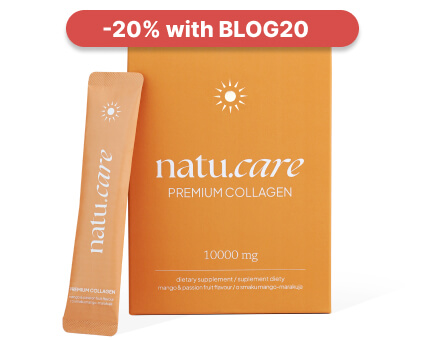
- Collagen content: 10,000 mg marine collagen hydrolysate
- Additional active ingredients: vitamin C, low molecular weight hyaluronic acid (and L-theanine and coenzyme Q10 in cocoa flavoured collagen or vitamin A and vitamin E in mango–passion fruit flavoured collagen)
- Form: powder sachets
- Dose: 1 sachet per day
- Sufficient for: 30 days
Product description
One of the strongest collagens on the market, whichós provides as much as 10,000 mg in a daily serving. This allows the formula to effectively support the condition of the skin, hair and nails.
With this supplement, you will support your beauty, which will allow you to visually stop the ageing process and feel a second youth!
Natu.Care Collagen Premium 10 000 mg comes in two flavours – cherry and mango-maracuja. Both formulas have the same product backbone – collagen, hyaluronic acid and vitamin C.
In the cherry version you additionally find glucosamine, chondroitin and Indian frankincense resin extract. Mango-maracuja, on the other hand, contains vitamin E and vitamin A.
Pros and cons
Pros:
- Tested collagen formula – SeaGarden, whose effects have been confirmed in clinical studies.
- Effective dose of hyaluronic acid, additionally moisturizing the skin and positively impacting joint health.
- Vitamin C supports the body’s natural collagen production.
- The composition has been tested by the independent and accredited J.S. Hamilton laboratory.
- The product has an MSC (Marine Stewardship Council) quality certification – the collagen source supports sustainable fishing practices.
Cons:
- None.
Additional information
Users praise Natu.Care Collagen Premium for the easy dissolvability of the powder.
User review
I noticed a significant improvement in my skin texture after a few weeks of taking collagen regularly. My complexion is now as soft as velvet!
Natu.Care Collagen Premium 10000 mg, cherry

- Collagen content: 10,000 mg of hydrolyzed bovine collagen
- Additional active ingredients: vitamin C, low molecular weight hyaluronic acid, glucosamine, chondroitin, extract of Indian frankincense resin (boswellia serrata)
- Form: powder sachets for drinking
- Serving: 1 sachet per day
- Lasts for: 30 days
Product description
One of the strongest collagens on the market, providing as much as 10,000 mg per daily serving. This product can effectively support the condition of joints, skin, hair, and nails.
With this supplement, you will support your skeletal and joint system as well as your beauty, helping you visually halt the aging process and feel rejuvenated!
Pros and cons
Pros:
- The daily portion of collagen is very large – as much as 10,000 mg.
- Proven collagen formula – COLLinstant, whose effectiveness has been confirmed in clinical studies.
- Effective dose of hyaluronic acid, which additionally moisturizes the skin and positively affects joint health.
- Vitamin C supports the body's natural collagen production.
- Glucosamine is a fundamental building block of compounds found in joint cartilage and a component of collagen that gives elasticity to connective tissue in tendons.
- Chondroitin is a natural component found in the human body, mainly in cartilage. This large molecule (mucopolysaccharide) has the ability to absorb water, which helps maintain the elasticity and resilience of cartilage.
- Frankincense resin extract supports blood circulation and joint mobility and reduces their stiffness. It may help alleviate inflammatory conditions.
- The composition has been tested by the independent and accredited J.S. Hamilton laboratory.
Cons:
- None.
Additional information
Users praise Natu.Care Collagen Premium for the easy dissolving of the powder.
Premium Sodium Butyrate
Product description
Premium Sodium Butyrate is a natural support for your digestive system. With a high dose of butyric acid (940 mg), it supports the regeneration of the intestinal mucosa, improving gut health and function, and aids in the absorption of nutrients. By taking care of your intestines, you're taking care of the health of your entire body.
Studies involving people suffering from irritable bowel syndrome confirm that sodium butyrate is ideal for supporting issues related to bacterial flora imbalances (for example, after antibiotic therapy), constipation and diarrhea, inflammation of the intestinal mucosa, or a diet low in fiber.
Premium Sodium Butyrate capsules are made using the innovative DRcaps® technology. This guarantees that the active ingredients in the product are protected from the destructive effects of stomach acids and digestive enzymes. As a result, we can be sure that the beneficial ingredients are released in the small intestine and are fully absorbed by our body.
Premium Sodium Butyrate from Natu Care is 100% tested, and its composition contains only the highest quality raw materials.
Pros and cons
Pros:
- Supports digestive system function
- Helpful for various gastrointestinal conditions, including IBS
- High dose of butyric acid in each capsule
- Eco-friendly, clean, and tested composition
- Free from added sugar, gluten, GMOs, and lactose
- Innovative capsule technology - DRcaps
Cons:
- None
Additional Information
Take 3 capsules daily at any time of the day, preferably with a meal. Swallow the capsules whole with water.
Premium Sodium Butyrate is intended for adults.
The product should be used under medical supervision.
User review
I've been using the product for 2 weeks. My stomach feels lighter, and my digestion has improved. I recommend it.
Natu.Care Premium Magnesium + Vitamin B6
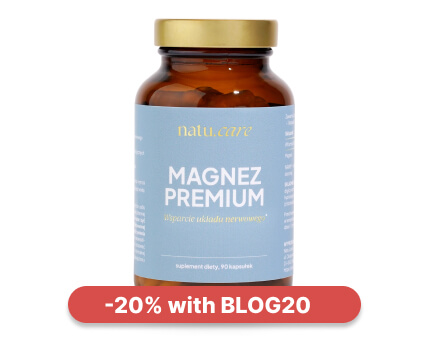
- Magnesium content per day: 305 mg
- Additional active ingredients: Vitamin B6 (2.1 mg)
- Form: capsules
- Serving size: 3 capsules per day
- Sufficient for: 30 days
Product description
The Premium Magnesium + Vitamin B6 dietary supplement is a comprehensive product that combines three organic forms of magnesium (citrate, malate, and diglycinate) and vitamin B6 in highly absorbable forms.
Magnesium is an essential mineral without which our bodies cannot function properly. It supports the immune, nervous, and muscular systems, maintains electrolyte balance, and is involved in cell division and the regulation of mental functions.
Research shows that magnesium supplementation is even more effective when accompanied by vitamin B6, which is included in our product. Vitamin B6 is responsible for the proper functioning of the nervous and immune systems, as well as the proper functioning of the heart.
If you want to safely get rid of feelings of fatigue, concentration problems, hair loss, muscle cramps, trembling, or irritability, reach for Premium Magnesium from Natu.Care, tested by the independent, certified laboratory J.S. Hamilton Poland.
Pros and cons
Pros
- Supports the proper functioning of the nervous and immune systems.
- Reduces feelings of fatigue and tiredness.
- Maintains proper psychological functions.
- The purity of the ingredients (free from anti-caking agents, artificial fillers, and additives such as titanium dioxide, microcrystalline cellulose, talc, magnesium stearate, and silicon dioxide) has been confirmed by laboratory tests.
- High absorption of ingredients.
- Soft capsules that are easy to swallow.
- Suitable for vegetarians and vegans.
Cons
- None.
Additional information
Take with a meal, 3 capsules per day.
The capsules should be taken with at least 250 ml of water.
If you have trouble sleeping, it is advisable to take 1 capsule in the morning and 2 capsules in the evening, no later than 4 hours before bedtime.
Avoid combining with products high in calcium (milk, yogurt, cheese), as this may negatively affect magnesium absorption.
Pregnant and breastfeeding women should consult a doctor before starting supplementation.
User review
I’m very impressed with the speed of delivery. The product itself is of high quality and absorbs well. After two weeks of supplementation, I’ve noticed a significant improvement in muscle recovery, especially during periods of intense training. I highly recommend it!
Product description
The dietary supplement contains omega-3ᵀᴳ, or omega-3 acids in the form of trójglyceridesów. Scientific studies suggest that this form of fatty acidsós up to 2 times better absorbed than the estersós present in many dietary supplements on the market. This means that you are assured of their effectiveness and of supplying yourself with valuable omega acids.
Fatty acids omega-3 are derived from wild anchovy oil. It is a rich source of healthy fats that are essential for the health of the cardiovascular, immune and nervous systems, as well as the proper function of vision, joints muscles.
Scientific research suggests that wild anchovies are a good source of healthy fats.
Scientific research also suggests that an adequate intake of omega-3 fatty acidsós protects against and supports the treatment of depression and anxiety disorders. In addition, omega-3s influence the hydration and appearance of the skinóry and support healthy sleep.
.
The formula contains a total of 750 mg of EPA+DHA acidsós, which is three times higher than the recommended minimum of 250 mg for the Polish population. Omega-3 TG Premium has studies indicating that its TOTOX is 9, which is a very good result.
Supplementation of omega-3 fatty acidsóis recommended for anyone who does not eat 1–2 portions (approximately 300 g) of oily fish per week. Children during growth, seniors, physically active people, vegans and vegetarians, as well as patients undergoing cardiovascular treatment and prevention of heart disease also have an increased need.
Pros and cons
The dietary supplement contains omega-3ᵀᴳ, or omega-3 acids in the form of trójglyceridesów. Scientific studies suggest that this form of fatty acidsós up to 2 times better absorbed than the estersós present in many dietary supplements on the market. This means that you are assured of their effectiveness and of supplying yourself with valuable omega acids.
Fatty acids omega-3 are derived from wild anchovy oil. It is a rich source of healthy fats that are essential for the health of the cardiovascular, immune and nervous systems, as well as the proper function of vision, joints muscles.
Scientific research suggests that wild anchovies are a good source of healthy fats.
Scientific research also suggests that an adequate intake of omega-3 fatty acidsós protects against and supports the treatment of depression and anxiety disorders. In addition, omega-3s influence the hydration and appearance of the skinóry and support healthy sleep.
.
The formula contains a total of 750 mg of EPA+DHA acidsós, which is three times higher than the recommended minimum of 250 mg for the Polish population. Omega-3 TG Premium has studies indicating that its TOTOX is 9, which is a very good result.
Supplementation of omega-3 fatty acidsóis recommended for anyone who does not eat 1–2 portions (approximately 300 g) of oily fish per week. Children during growth, seniors, physically active people, vegans and vegetarians, as well as patients undergoing cardiovascular treatment and prevention of heart disease also have an increased need.
Additional information
The dietary supplement contains omega-3ᵀᴳ, or omega-3 acids in the form of trójglyceridesów. Scientific studies suggest that this form of fatty acidsós up to 2 times better absorbed than the estersós present in many dietary supplements on the market. This means that you are assured of their effectiveness and of supplying yourself with valuable omega acids.
Fatty acids omega-3 are derived from wild anchovy oil. It is a rich source of healthy fats that are essential for the health of the cardiovascular, immune and nervous systems, as well as the proper function of vision, joints muscles.
Scientific research suggests that wild anchovies are a good source of healthy fats.
Scientific research also suggests that an adequate intake of omega-3 fatty acidsós protects against and supports the treatment of depression and anxiety disorders. In addition, omega-3s influence the hydration and appearance of the skinóry and support healthy sleep.
.
The formula contains a total of 750 mg of EPA+DHA acidsós, which is three times higher than the recommended minimum of 250 mg for the Polish population. Omega-3 TG Premium has studies indicating that its TOTOX is 9, which is a very good result.
Supplementation of omega-3 fatty acidsóis recommended for anyone who does not eat 1–2 portions (approximately 300 g) of oily fish per week. Children during growth, seniors, physically active people, vegans and vegetarians, as well as patients undergoing cardiovascular treatment and prevention of heart disease also have an increased need.
Expert opinion
The dietary supplement contains omega-3ᵀᴳ, or omega-3 acids in the form of trójglyceridesów. Scientific studies suggest that this form of fatty acidsós up to 2 times better absorbed than the estersós present in many dietary supplements on the market. This means that you are assured of their effectiveness and of supplying yourself with valuable omega acids.
Fatty acids omega-3 are derived from wild anchovy oil. It is a rich source of healthy fats that are essential for the health of the cardiovascular, immune and nervous systems, as well as the proper function of vision, joints muscles.
Scientific research suggests that wild anchovies are a good source of healthy fats.
Scientific research also suggests that an adequate intake of omega-3 fatty acidsós protects against and supports the treatment of depression and anxiety disorders. In addition, omega-3s influence the hydration and appearance of the skinóry and support healthy sleep.
.
The formula contains a total of 750 mg of EPA+DHA acidsós, which is three times higher than the recommended minimum of 250 mg for the Polish population. Omega-3 TG Premium has studies indicating that its TOTOX is 9, which is a very good result.
Supplementation of omega-3 fatty acidsóis recommended for anyone who does not eat 1–2 portions (approximately 300 g) of oily fish per week. Children during growth, seniors, physically active people, vegans and vegetarians, as well as patients undergoing cardiovascular treatment and prevention of heart disease also have an increased need.
Natu.Care Vitamin D 2000 UI
Product description
Vitamin D plays a crucial role in our health and well-being. It affects calcium and phosphate metabolism, which translates to healthy bones and teeth. It also helps regulate the immune system, and studies indicate its influence on the functioning of the nervous system.
Vitamin D, although called a “vitamin,” is actually a prohormone that our body produces on its own, primarily under the influence of sunlight. Unfortunately, our modern lifestyle contributes to deficiencies of this essential vitamin. Working in enclosed office buildings, using (necessary!) SPF creams, and covering the body with clothing all make it very difficult, if not impossible, to obtain adequate levels of vitamin D from sunlight. This is why appropriate, year-round supplementation is so crucial.
Vitamin D from Natu.Care is a well-tested vitamin D3 suspended in safflower oil, a plant known for its numerous health benefits. The convenient, easy-to-swallow capsule will make supplementation a part of your daily, healthy routine, improving your overall well-being.
Pros and cons
Pros:
- Ensures proper functioning of the immune system
- Supports the maintenance of healthy bones and teeth
- Maintains proper heart, kidney, and muscle function
- Tested by an independent, certified laboratory
- Convenient and easy-to-swallow capsule
- Clean composition - free from added sugar, gluten, GMOs, lactose, and without preservatives or colorants
Cons:
- None.
Additional Information
Pregnant women and breastfeeding mothers should consult a doctor before using the product. This dietary supplement is intended for a healthy adult population up to the age of 75.
Collagen Booster - Glow Stories
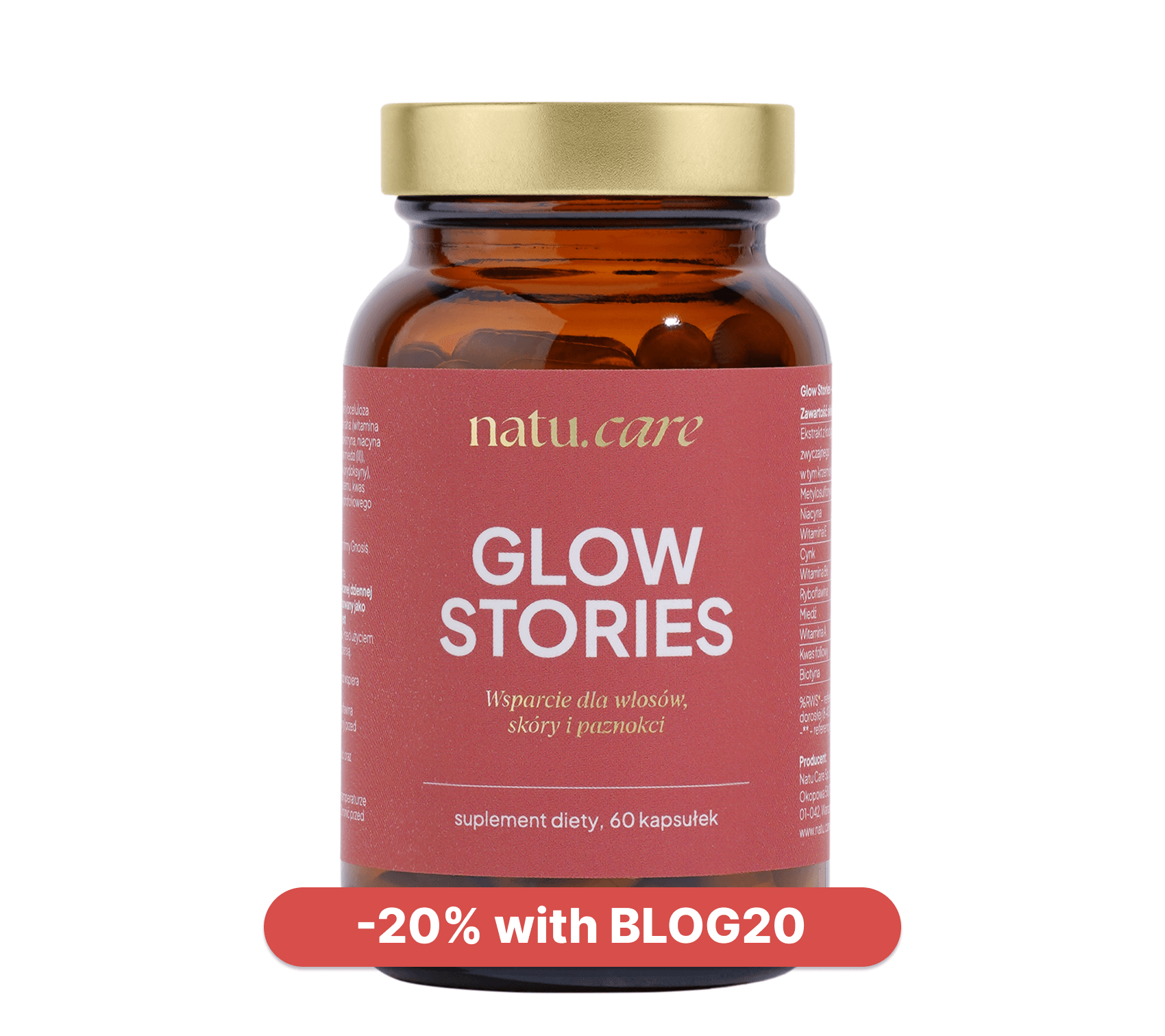
- Active ingredients: bamboo shoot extract, Quatrefolic®, L-Methionine, L-cysteine, vitamin E, vitamin A, niacin (vitamin B3), vitamin B6, vitamin B2 (riboflavin), biotin, zinc, copper
- .
- Form: capsules
- .
- Dose: 1 capsule per day
- .
- Sufficient for: 60 days
- .
Product description
A dietary supplement containing vitamins, minerals and plant extracts thatósupport the skinóhand, hair and nails. The product is especially distinguished by the form of folate – it is Quatrefolic, whichós absorbed very well and is natural.
In addition to valuable vitamins and minerals, such as vitamin A, E, B3, B2 and biotin, the formula contains bamboo shoot extract, whichóry further enhances your beauty.
Pros and cons
A dietary supplement containing vitamins, minerals and plant extracts thatósupport the skinóhand, hair and nails. The product is especially distinguished by the form of folate – it is Quatrefolic, whichós absorbed very well and is natural.
In addition to valuable vitamins and minerals, such as vitamin A, E, B3, B2 and biotin, the formula contains bamboo shoot extract, whichóry further enhances your beauty.
Additional information
A dietary supplement containing vitamins, minerals and plant extracts thatósupport the skinóhand, hair and nails. The product is especially distinguished by the form of folate – it is Quatrefolic, whichós absorbed very well and is natural.
In addition to valuable vitamins and minerals, such as vitamin A, E, B3, B2 and biotin, the formula contains bamboo shoot extract, whichóry further enhances your beauty.
Cysteine - side effects
.Cysteine is safe, however - as with any supplement - it can cause some side effects. What are the most common side effects?
.Gastrointestinal problems.
It is a very rare side effect.
|
Side effect . |
What are the characteristics of and |
|
Gastrointestinal problems . |
Gastrointestinal problems such as nausea, vomiting, heartburn or abdominal pain. They occur particularly frequently when the supplement is consumed on an empty stomach. |
|
Allergic reactions . |
Slightly less frequent allergic reactions may occur. Symptoms then include itching, rash, trouble breathing or swelling of the face and throat. If symptoms flare up or do not go away after stopping the supplement, see your doctor. There is no need to take the supplement. |
|
Fatigue |
This is a very occasional side effect of cysteine supplementation. Nonetheless, it can occur when the body is unable to assimilate it properly. Fatigue |
In addition to this, cysteine can also interact with certain drugs, such as nitroglycerine. Therefore, if you are taking any drugs, check with your doctor before starting supplementation.
Cysteine - reviews
.I have been using Cysteine as a supplement for about 6 months and have noticed a significant improvement in my hair. They are now shinier and stronger..
Wioletta35 years old
Cysteine has worked fantastically on my skin. After several months of use, my complexion became smooth and radiant..
Katarzyna30 years old
A friend recommended cysteine to me for immune system support. Since I started using it I get sick less often, and even if I do, the sickness passes more quickly.
Jan58 years old
I have tried cysteine, but unfortunately I have not noticed any significant change. Maybe it works better in others, but I haven't noticed any benefit..
Monica32 years old
I was taking cysteine, but after a few days I started to feel nauseous. Maybe it wasn't because of it, but to be safe I stopped supplementation..
Beata40 years old
Summary
.- Cysteine is an endogenous amino acid that has many functions in the body.
- The chemical formula of cysteine is: cysteine.
- The chemical formula of cysteine is: C3H7NO2S.
- The chemical formula of cysteine is.
- N-acetylcysteine (NAC) is a derivative of cysteine, popularly used as a supplement. .
- Cysteine has a positive effect on skin health, detoxification of the body, normal metabolism, immunity and insulin production.
- The dosage of cysteine depends on a number of factors, but a typical serving is between 100 and 500 mg per day.
- Cysteine is found in many foods, such as sunflower seeds, meat and eggs. .
- Cysteine supplementation is used to support the immune system or detoxify the body, among other things.
- Cysteine supplementation is used to support the immune system or detoxify the body.
- Supplementation with cysteine can lead to some side effects, such as gastric problems, allergic reactions or unusual tiredness.
- Opinions on cysteine supplementation vary, with some people appreciating its effects on hair or skin condition, while others feel no significant change. .
FAQ
.Glycine + cysteine - how do they work?
.Glycine and cysteine are amino acids with key functions in the body. Cysteine is essential for the production of glutathione, which neutralises free radicals, reducing oxidative stress. Glycine supports the nervous system, affecting the ability to concentrate and improving sleep quality. Consuming them together can effectively support the body's detoxification and overall health.
Can L-cysteine be harmful?
.L-cysteine is generally safe for healthy individuals. However, like any supplement, it can lead to unwanted side effects such as stomach problems, allergic reactions or feelings of severe fatigue.
Also, it may interact with some medications. Its use in such cases should therefore always be consulted with a physician.
.
In what forms are supplements with cysteine available?
.Supplements with cysteine are available in several forms. The most common form is capsules and tablets, which are easy to dose and take. Another form is a powder, which can be added to food or drinks.
Outside of this, you can also find cysteine as part of multi-ingredient supplements to boost hair, skin and nail health. An example of such a supplement is Glow Stories from Natu.Care.
What is the price of cysteine supplements?
.The price of cysteine supplements can vary considerably depending on the brand, the form of the supplement or the number of servings per packet. Usually, however, the price of supplements with this ingredient is within the range of 20 to 100 PLN.
Please note that the price of supplements with cysteine can vary significantly depending on the brand.
Remember that the cost does not always reflect the quality of the product, so it is worth paying attention to the purity of the composition and the reputation of the manufacturer before purchasing.
Is L-cysteine only found in meat products?
.No, although meat and livestock products are rich sources of cysteine, an amino acid you can also find this in some plant sources. Examples include sunflower seeds and lentils.
Who is at risk of cysteine deficiency?
.Cysteine is an amino acid endogenous, meaning that the human body can produce it on its own. Nevertheless, during certain metabolic diseases or inflammatory conditions, the need for it increases. In such cases, it is worth considering reasonable supplementation.
Does cysteine affect the skin ageing process?
.Yes. Cysteine plays an important role in skin ageing. It is a precursor to glutathione, one of the most important antioxidants in the body. Glutathione helps neutralise oxidative stress, which causes skin ageing. As a result, cysteine can help increase the skin's resistance to damage and slow down the ageing process.
Sources
.See all
.Clemente Plaza, N., Reig García-Galbis, M., & Martínez-Espinosa, R. M. (2018). Effects of the Usage of l-Cysteine (l-Cys) on Human Health. Molecules, 23(3), Article 3. https://doi.org/10.3390/molecules23030575
Correia, M. J., Pimpão, A. B., Fernandes, D. G. F., Morello, J., Sequeira, C. O., Calado, J., Antunes, A. M. M., Almeida, M. S., Branco, P., Monteiro, E. C., Vicente, J. B., Serpa, J., & Pereira, S. A. (2022). Cysteine as a Multifaceted Player in Kidney, the Cysteine-Related Thiolome and Its Implications for Precision Medicine. Molecules (Basel, Switzerland), 27(4), 1416. https://doi.org/10.3390/molecules27041416
Duperray, J., Sergheraert, R., Chalothorn, K., Tachalerdmanee, P., & Perin, F. (2022). The effects of the oral supplementation of L-Cystine associated with reduced L-Glutathione-GSH on human skin pigmentation: A randomized, double-blinded, benchmark- and placebo-controlled clinical trial. Journal of Cosmetic Dermatology, 21(2), 802-813. https://doi.org/10.1111/jocd.14137
Eriksson, C. J. P., Metsälä, M., Möykkynen, T., Mäkisalo, H., Kärkkäinen, O., Palmén, M., Salminen, J. E., & Kauhanen, J. (2020). L-Cysteine Containing Vitamin Supplement Which Prevents or Alleviates Alcohol-related Hangover Symptoms: Nausea, Headache, Stress and Anxiety. Alcohol and Alcoholism (Oxford, Oxfordshire), 55(6), 660-666. https://doi.org/10.1093/alcalc/agaa082
Jain, S. K., Micinski, D., & Parsanathan, R. (2021). L-Cysteine Stimulates the Effect of Vitamin D on Inhibition of Oxidative Stress, IL-8, and MCP-1 Secretion in High Glucose Treated Monocytes. Journal of the American College of Nutrition, 40(4), 327-332. https://doi.org/10.1080/07315724.2020.1850371
Jiao, N., Wang, L., Wang, Y., Xu, D., Zhang, X., & Yin, J. (2022). Cysteine Exerts an Essential Role in Maintaining Intestinal Integrity and Function Independent of Glutathione. Molecular Nutrition & Food Research, 66(3), e2100728. https://doi.org/10.1002/mnfr.202100728
Marino, S. M., & Gladyshev, V. N. (2010). Cysteine function governs its conservation and degeneration and restricts its utilization on protein surfaces. Journal of Molecular Biology, 404(5), 902-916. https://doi.org/10.1016/j.jmb.2010.09.027
McPherson, R. A., & Hardy, G. (2011). Clinical and nutritional benefits of cysteine-enriched protein supplements. Current Opinion in Clinical Nutrition and Metabolic Care, 14(6), 562-568. https://doi.org/10.1097/MCO.0b013e32834c1780
Raghu, G., Berk, M., Campochiaro, P. A., Jaeschke, H., Marenzi, G., Richeldi, L., Wen, F.-Q., Nicoletti, F., & Calverley, P. M. A. (2021). The Multifaceted Therapeutic Role of N-Acetylcysteine (NAC) in Disorders Characterized by Oxidative Stress. Current Neuropharmacology, 19(8), 1202-1224. https://doi.org/10.2174/1570159X19666201230144109
Schwalfenberg, G. K. (2021). N-Acetylcysteine: A Review of Clinical Usefulness (an Old Drug with New Tricks). Journal of Nutrition and Metabolism, 2021, 9949453. https://doi.org/10.1155/2021/9949453
Tenório, M. C. dos S., Graciliano, N. G., Moura, F. A., Oliveira, A. C. M. de, & Goulart, M. O. F. (2021). N-Acetylcysteine (NAC): Impacts on Human Health. Antioxidants, 10(6), Article 6. https://doi.org/10.3390/antiox10060967
Yoon, S. J., Combs, J. A., Falzone, A., Prieto-Farigua, N., Caldwell, S., Ackerman, H. D., Flores, E. R., & DeNicola, G. M. (2023). Comprehensive Metabolic Tracing Reveals the Origin and Catabolism of Cysteine in Mammalian Tissues and Tumors. Cancer Research, 83(9), 1426-1442. https://doi.org/10.1158/0008-5472.CAN-22-3000
Editorials
Meet the team

Ilona Krzak obtained her Master of Pharmacy degree from the Medical University of Wrocław. She did her internship in a hospital pharmacy and in the pharmaceutical industry. She is currently working in the profession and also runs an educational profile on Instagram: @pani_z_apteki

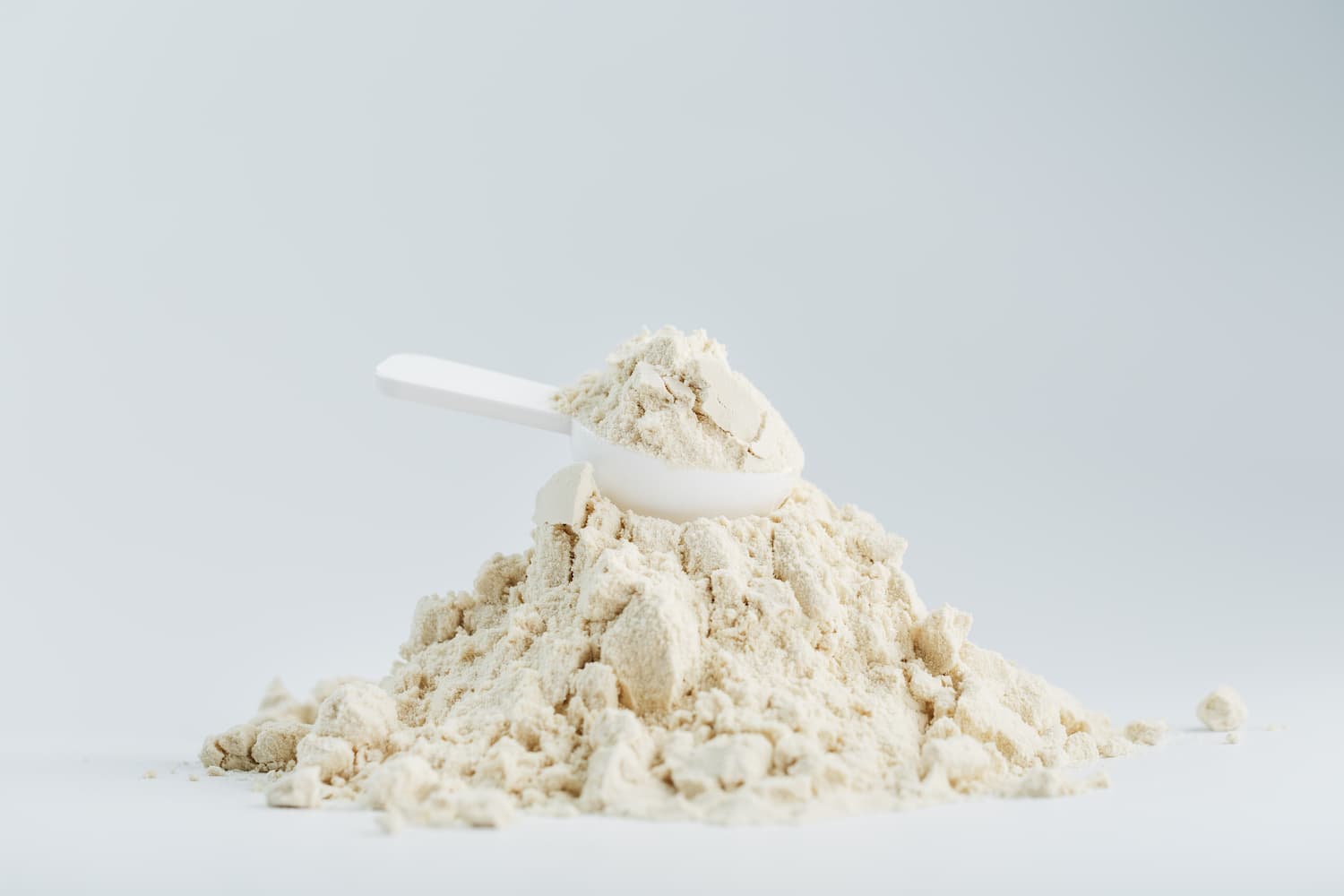
Vegan protein supplements add protein to the diets of athletes and non-athletes alike.

Look after the protein in your diet whether you are on a weight gain, weight reduction or weight maintenance.
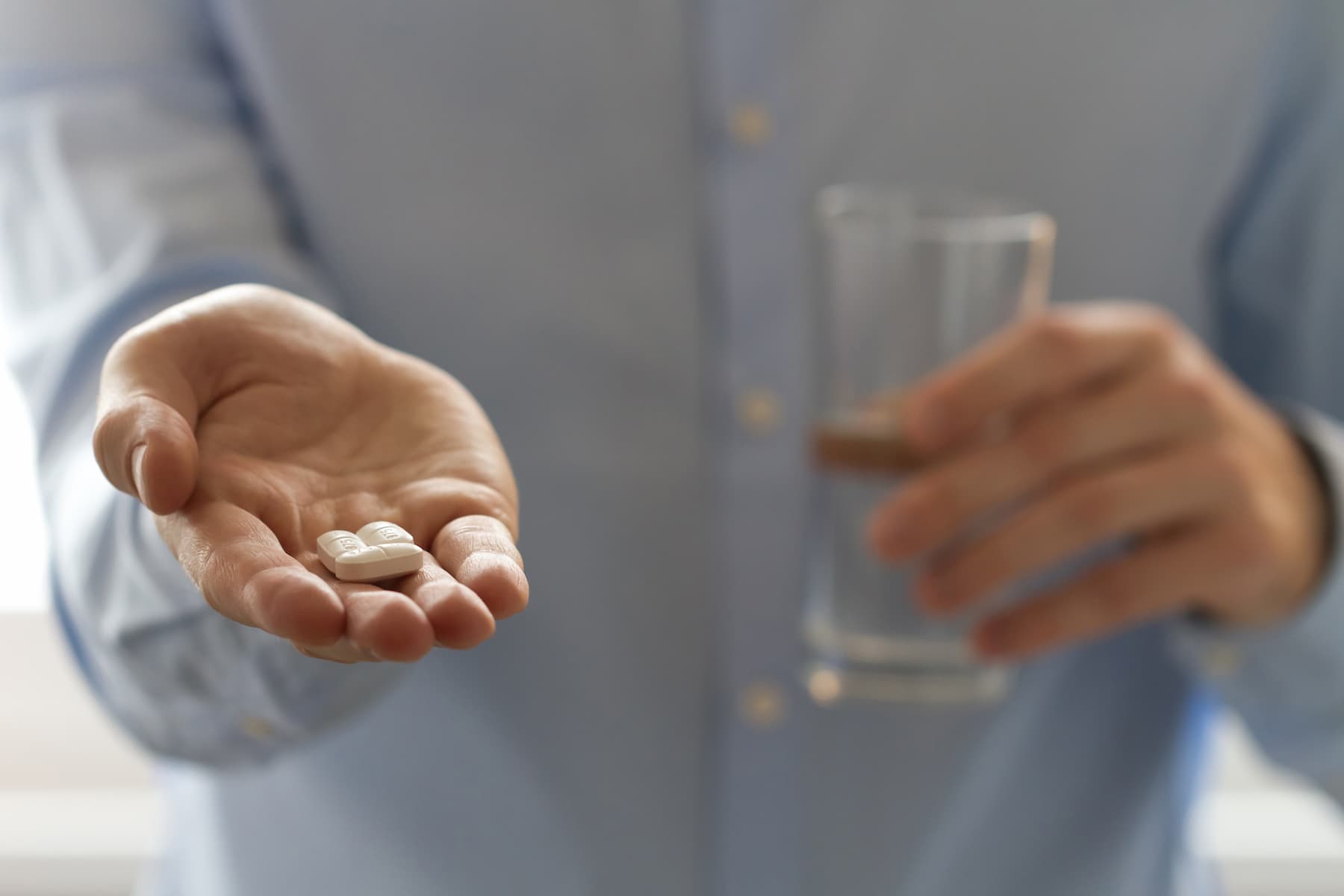
Methionine is a little-known amino acid that is responsible for many functions in the body.
